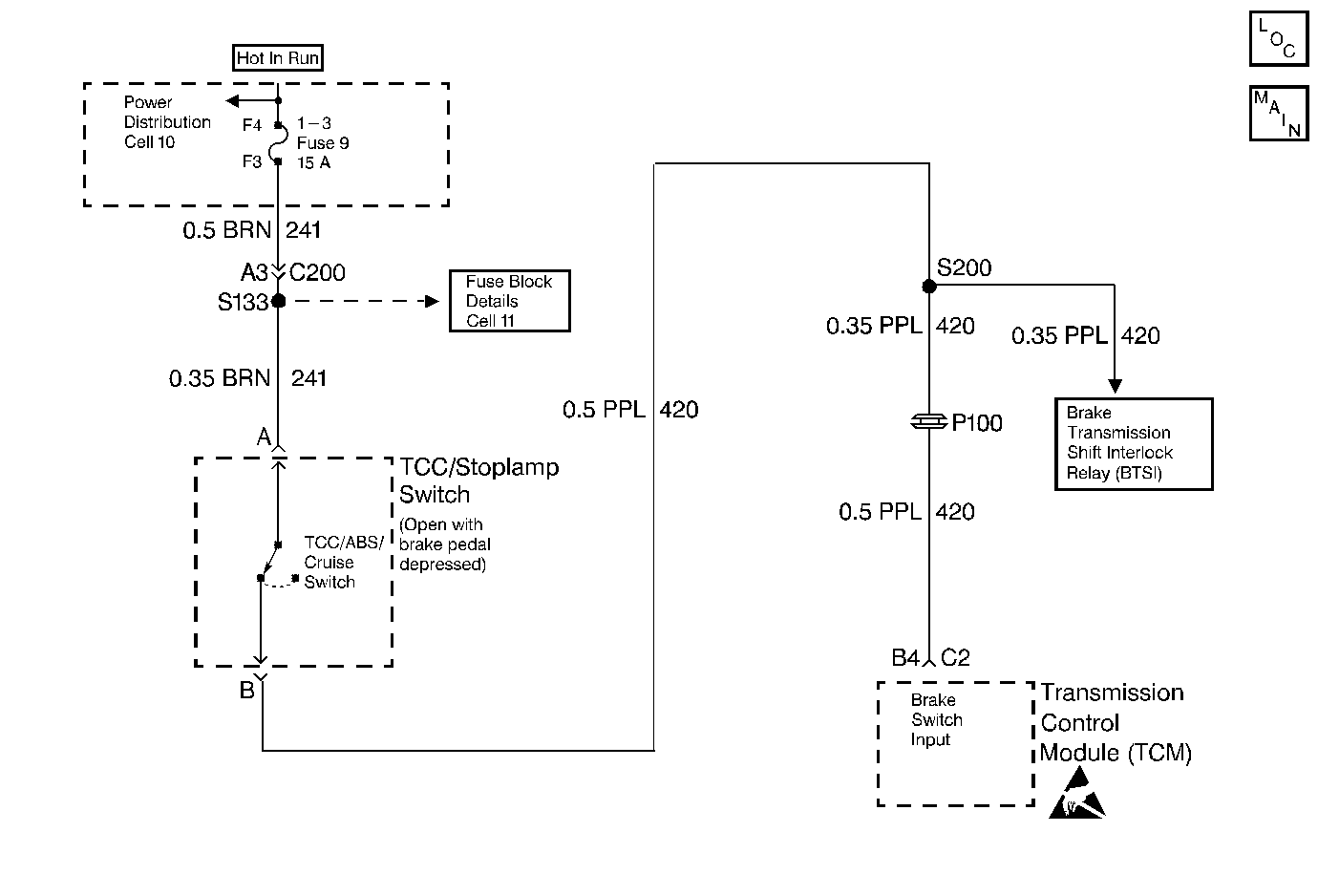
Circuit Description
The TCC Stoplamp switch indicates the brake pedal status. The normally-closed TCC Stoplamp switch supplies a B + signal on circuit 420 to the Transmission Control Module (TCM). The signal voltage circuit opens when the brakes are applied. The TCM uses the open signal voltage circuit in order to de-energize the Torque Converter Clutch Pulse Width Modulation Solenoid Valve (TCC PWM Sol. Valve) when the brakes are applied.
If the TCM detects a closed TCC Stoplamp switch circuit during accelerations, then DTC 38 sets.
Conditions for Setting the DTC
| • | The TCM detects a closed TCC Stoplamp brake switch/circuit (12 volts) for 2 seconds during decelerations. |
| • | The following sequence of events occurs seven consecutive times: |
| - | The vehicle speed is greater than 32 km/h (20 mph) for 6 seconds. |
| - | Then the vehicle speed is 8 32 km/h (5 20 mph) for 6 seconds. |
| - | Then the vehicle speed is less than 8 km/h (5 mph). |
Action Taken When the DTC Sets
| • | The TCM does not illuminate the Malfunction Indicator Lamp (MIL). |
| • | The TCM inhibits TCC. |
| • | The TCM will inhibit 4th gear if in hot mode. |
| • | DTC 38 is stored in TCM history. |
Conditions for Clearing the DTC
| • | The TCM clears the DTC from Current to History when the fault condition(s) no longer exist and the ignition switch is cycled OFF and then ON. |
| • | A scan tool can clear the DTC from Current and History status. The TCM clears the DTC from the TCM history if the vehicle completes 40 ignition cycles without a failure reported. |
| • | The TCM cancels the DTC default actions when the fault no longer exists and the ignition is cycled OFF and then ON. |
Diagnostic Aids
| • | Inspect the wiring at the TCM, the TCC Stoplamp Switch connector and all other circuit connecting points for the following conditions: |
| - | A bent terminal |
| - | A backed out terminal |
| - | A damaged terminal |
| - | Poor terminal tension |
| - | A chafed wire |
| - | A broken wire inside the insulation |
| - | Moisture intrusion |
| - | Corrosion |
| • | When diagnosing for an intermittent short or open, massage the wiring harness while watching the test equipment for a change. |
| • | Ask about the customer's driving habits and any unusual driving conditions he or she might have, such as stop and go traffic or expressway driving. |
| • | Inspect the TCC Stoplamp switch for proper mounting and adjustment. |
| • | Inspect for the most current calibration ID and the latest bulletins. |
| • | Inspect for any transmission DTCs that may have reset. |
Test Description
The numbers below refer to the step numbers on the diagnostic table.
-
This step isolates the TCC stoplamp switch as a source for setting the DTC.
Step | Action | Value(s) | Yes | No |
|---|---|---|---|---|
1 | Was the Powertrain On-Board Diagnostic (OBD) System Check performed? | -- | ||
2 |
Important:: Before clearing the DTC's, record the Current and History DTC's information for reference. The Clear Info function erases the stored Current and History DTC from the TCM. Did the TCC Brake Switch status change from Closed to Open? | -- | Go to Diagnostic Aids | |
Did the TCC Brake Switch status change from Closed to Open? | -- | |||
4 | Replace the TCC Stoplamp switch. Refer to Stop Lamp Switch Replacement . Is the replacement complete? | -- | -- | |
5 | Inspect circuit 420 for a short to B +. Refer to General Electrical Diagnosis . Did you find a short to B + condition? | -- | ||
6 | Replace the TCM. Refer to DTC 51 PROM Error TCM Replacement. Is the replacement complete? | -- | -- | |
7 | In order to verify your repair, perform the following procedure:
Does the Scan Tool TCC Brake Switch status change from Closed to Open? | -- | System OK | Begin the diagnosis again. |
